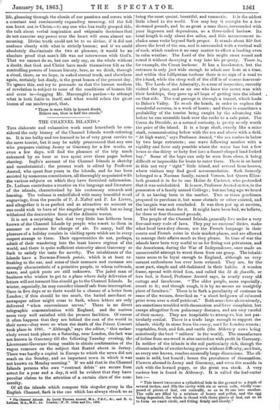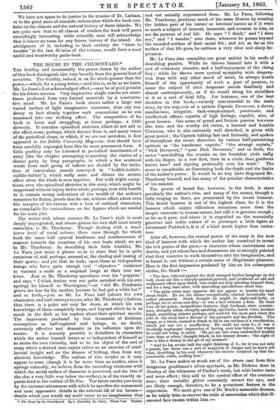THE CHANNEL ISLANDS.* Tars elaborate and exhaustive work must henceforth
be con- sidered the only history of the Channel Islands worth referring to. It is too bulky and too learned to be of very great service to the mere tourist, but it may be safely pronounced that any one who phrposes visiting Jersey or Guernsey for a few weeks, or even a few days, will find the pleasure of the trip much enhanced by an hour or two spent over these pages before starting. Inglis's account of the Channel Islands is sketchy and unsubstantial ; the present work is edited by Professor Ansted, who spent four years in the islands, and he has been assisted by numerous contributors, all thoroughly acquainted with the various subjects on which they have furnished information. Dr. Latham contributes a treatise on the language and literature of the islands, characterized by his customary research and learning. The volume is embellished with many beautiful wood engravings, from the pencils of P. J. Naftel and P. Le Lievre, and altogether it is as perfect and as attractive an account as one could wish to have of the singular group which has so long withstood the destructive force of the Atlantic waves.
It is not a surprising fact that very little has hitherto been known of the Channel Islands by people who resort to them in summer or autumn for change of air. To many, half the pleasure of a holiday consists in visiting spots which are in every respect strange to them. Their opportunities do not, perhaps, admit of their wandering into the least known regions of the world, and there is quite sufficient obscurity about Guernsey or Sark to satisfy the taste for novelty. The inhabitants of the islands have a Norman-French patois, which is at least re- freshing to the ear, and some of their manners and customs are strongly characteristic of a primitive people, to whom railroads, taxes, and quick posts are still unknown. The jaded man of business who wishes to get to a place where daily deliveries of letters will not torment him should go to the Channel Islands. In winter, especially, he may consider himself safe from interruption'. Once in five days or so there would be a chance of a letter from London; if this should be too much, the baited merchant or newspaper editor might cross to Sark, where letters are only delivered "when convenience serves." There is no direct telegraphic communication with England, and the natives seem very well satisfied with the present facilities. Of course it often happens that they are behind the rest of the world in their news—they were so when the death of the Prince Consort took place in 1861. "Although," says the editor, 'this melan- choly event took place on a Saturday, near London, the fact was not known in Guernsey till the following Tuesday evening, the Lieutenant-Governor being unable to obtain confirmation of the vague rumours on the subject that floated about in Jersey. There was hardly a capital in Europe to which the news did not reach on the Sunday, and no important town in which it was not known on Monday morning." If we add that in the Channel Islands persons who owe "contract debts" are secure from arrest for a year and a day, it will be evident that they have peculiar claims to the attention of a certain class of the com- munity.
Of all the islands which compose this singular group in the English Channel, Sark is the one which has always struck us as
* The Manua Islands. By David Thomas Austad, M.A.; F.B.C., Ac., and B. G. Latham, M.D., the. London :iv. H. Allen and Co., 1862.
being the most quaint, beautiful, and romantic. it is the oddest little i:land in the world. You may buy it outright for a few thousand pounds, and be as great a man there, surrounded with your liegemen and dependents, as a three-tailed bashaw. Its total length is only about five miles, and this measurement in- cludes some rocks beyond Sark proper. It stands about 350 feet. above the level of the sea, and is surrounded with a vertical wall of rock, which renders it no easy matter to effect a landing even in calm weather. The Lord of the Isle might coast round and round it without descrying a way into his property. There is,.
for example, the Creux harbour. It has a breakwater, but the entrance is only just wide enough to admit one boat at a time, and within this Lilliputian harbour there is no sign of a road to. the island, while the steep wall of the cliff is of course inaccessi- ble. The Lords of the Admiralty, in a tour of inspection, recently visited the place, and as no one who knew the secret was with their lordships, they gave up all hope of getting into the island on that side.. The real passage is through a tunnel, which leads. to Baker's Valley. To reach the beach, in order to explore the wonderful caverns, is a work of hours ; and there is sometimes a probability of the tourist being caught by the advancing tide before he can scramble back over the rocks to a safe point. The Creux du Derrible, as a natural curiosity, is pretty nearly worth the price of the island. It is a large shaft, exactly like a mine- shaft, communicating below with the sea and above with a field. "At high water," says Professor Ansted, "the sea rushes in below by two large entrances ; one wave following another with a rapidity and force only possible where the water has but a few hours to rise thirty or forty feet into a funnel-shaped land-locked bay.' Some of the bays can only be seen from above, it being difficult or impossible for boats to enter them. There is an hotel in this not very " tight" little island, and several farm-houses, where visitors may find good accommodation. Sark formerly belonged to a Norman family, named Vernon, but Queen Eliza- beth granted it in fee to one Helier de Carteret, who pretended that it was uniuhabited. It is now, Professor Ansted states, in the- possession of a family named Collings ; but not long ago we heard of it as having been in the market. Two or three gentlemen proposed to purchase it, but some obstacle or other existed, and the bargain was not concluded. It was then put up at auction,. but no bid was made for it. It might have been had, we believe, for three or four thousand pounds.
The people of the Channel Islands generally live under a very free-and-easy code of laws. They pay no customs' duties, make- what local laws they choose, use the French language in their courts and French coins in their market-places, and are allowed. to manage their affairs much as they please. In time of war the islands have been very useful to us for fitting out privateers, and the Americans, during the War of Independence, once made an unsuccessful attempt to wrest them from our grasp. The inhabi- tants seem to be loyal enough to England, although no very earnest enthusiasm has ever been evinced. They are, for the- most part, simple and old-fashioned in their habits. A wooden frame, spread with dried fern, and called the lit de fonaille, or fern bed, is found, Professor Ansted says, in nearly every old cottage and farmhouse. "Time older people, more especially, resort to it ; and though rough, it is by no means an unsightly piece of furniture." There is in Sark a peculiarity of costume ha some of the women, described as "a short bedgown of coloured print worn over a stuff petticoat." Both sexes live abstemiously,. are sometimes troubled with rheumatism and liver complaint, but escape altogether from pulmonary diseases, and are very careful of their money. They are hospitable to strangers, but not par- ticularly cordial. There is a trade large enough to support the islands, chiefly in stone from Gusrnsey, used for London streets ; vegetables, fruit, and fish, and cattle (the Aldern.2y cows being notoriously the best " in the world). The manufacture of iodine from sea-weed is also carried on with profit in Guernsey.
In neither of the islands is the soil particularly rich, though the climate admits of exotics being grown without difficulty, and fruit,. as every one knows, reaches unusually large dimensions. The cli- mate is mild, but humid ; hence the prevalence of rheumatism.
Flowers abound in Jersey and Guernsey, and even the seaside is rich with the horned poppy, or the great sea stock. A very curious bee is found in Alderney. It is called the leaf-cutter bee :—
"This insect'excavates a cylindrical hole in the ground to a depth of several inches, and fills the cavity With six or seven cells, wholly com- posed of pieces of leaf, cut conically, so as to fit one into another. The cells are filled by a mixture of honey and pollen, and the egg- being deposited, the whole is closed with three pieces of leaf, cut so as. to form an exact circle, and fitting firmly and closely."
We have not space to do justice to the treatise of Dr. Latham, or to the great mass of scientific information which the book con- tains on the climate and the natural history of these islands. We are quite sure that to all classes of readers the work will prove exceedingly interesting, while scientific men will acknowledge that it leaves no room for any future history of the island. An abridgment of it, including in their entirety the "hints to tourists "in the last division of the volume, would form a most useful and trustworthy guide-book.































 Previous page
Previous page